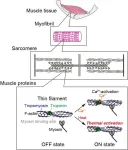(Press-News.org) New research from King’s College London has found that in the UK people with severe mental illness were at increased risk of death from all causes following COVID-19 infection compared to those without severe mental illness.
Published in the British Journal of Psychiatry, the study investigated the extent to which having severe mental illness, which includes schizophrenia and psychosis, increased the risk of death during the first two waves of the COVID-19 pandemic.
Researchers at the Institute of Psychiatry, Psychology & Neuroscience (IoPPN) and ESRC Centre for Society and Mental Health analysed data from over 660,000 UK patients between February 2020 and April 2021.
Among the 7146 people with severe mental illness, there was a 50 per cent greater risk of death from all causes following COVID-19 infection compared with those without severe mental illness.
Black Caribbean/Black African people were at a 22 per cent higher risk of death following COVID-19 infection than White people, and this was similar for people with and without severe mental illness. However, in around 30 per cent of patient data, ethnicity was not recorded.
The study revealed regional differences: on average, risk of death following COVID-19 infection was higher among Northern UK regions compared to Southern regions. Those in Northern Ireland, the East Midlands and the North-East were at between 24 – 28 per cent increased risk of death compared to those in London.
Dr Alex Dregan, senior author and Senior Lecturer in psychiatric epidemiology at King’s IoPPN said: “We are the first group to use the Clinical Practice Research Datalink to understand the impact of COVID-19 on premature morbidity among people with severe mental illness, making this one of the largest studies of its kind Previous research has shown that these health inequalities exist but our study really demonstrates how the pandemic has exacerbated them. We now need to try to understand why this is happening and see if there is a pattern in how these people do or do not seek and access services.”
The research also found that those with more than one long-term health condition (multimorbidity) were at greater risk of death: for each additional long-term health condition, the risk of death increased by six per cent for people with severe mental illness and 16 per cent for people without severe mental illness following COVID-19 infection.
The study is part of a Health Foundation funded project called COVID-19 Ethnic Inequalities in Mental health and Multimorbidities (COVE-IMM) that is using both quantitative and qualitative methods.
Principal investigator on the COVE-IMM project and co-lead of the platform for cohorts and quantitative methods at the ESRC Centre for Society and Mental Health, and lead author Dr Jayati Das-Munshi said:
“These are stark findings and highlight the health inequalities that exist for people living with severe mental illness, people from racialised groups and people from different regions of the country. We still need to learn more about the experiences of these groups which we are doing through in-depth interview research and we also need to understand the gap in how our services provide for these vulnerable people. The pandemic shone a light on these inequalities, and we must learn from this to develop new policies and improve service provision.”
The data was from the Clinical Practice Research Database – one of the world’s largest clinical research databases containing over 60 million anonymised electronic primary care records. Researchers were part of the ESRC Centre for Society and Mental Health, the National Institute for Health and Care Research (NIHR) Applied Research Collaboration (ARC) South London and the NIHR Maudsley Biomedical Research Centre.
END
People with severe mental illness at 50 per cent higher risk of death following COVID-19 infection
2023-10-25
ELSE PRESS RELEASES FROM THIS DATE:
Closing digital skills gap could spur global economic growth by $11.5 trillion
2023-10-25
This significant lack of expertise means firms are not fully embracing the automation revolution, costing businesses valuable time and money.
Intelligent Automation: Bridging the Gap between Business and Academia delves into how companies and universities can use intelligent automation to address the challenges preventing the workforce from prospering amid the Fourth Industrial Revolution.
(NEW YORK – October 16, 2023) The economic benefits of intelligent automation are vast, potentially totaling trillions of dollars in economic growth, according to research in a new book.
Businesses and organizations ...
Our favorite bittersweet symphonies may help us deal better with physical pain
2023-10-25
Research has shown that music might be a drug-free way to lower humans’ pain perception. This decreased sensitivity to pain – also known as hypoalgesia – can occur when pain stimuli are disrupted between their point of input and where they are recognized as pain by the conscious mind. In a new study, researchers in Canada have examined what type of music helps to dampen pain perception.
“In our study, we show that favorite music chosen by study participants has a much larger effect on acute thermal pain reduction than unfamiliar relaxing music” said Darius Valevicius, a doctoral student at the Université ...
New evidence explains how warming-up enhances muscle performance
2023-10-25
Osaka, Japan – Everybody knows the importance of warming up your muscles before a workout. But what is actually going on when we warm our muscles up, and are all muscles the same? You might be surprised to find out that the science behind this routine activity hasn’t always been clear.
Now, in a study recently published in the Journal of General Physiology, a multi-institutional research team, led by Osaka University, The Jikei University School of Medicine and National Institutes for Quantum Science and Technology, has revealed how heating affects the contraction of different muscles, and how this might benefit populations in need of improved ...
KERI's thermoelectric technology, key to space probes, attracting German attention
2023-10-25
Drs. SuDong Park, Byungki Ryu, and Jaywan Chung of the Korea Electrotechnology Research Institute (KERI) developed a new thermoelectric efficiency formalism and a high-efficiency multistage thermoelectric power generator module. This innovation can boost nuclear battery performance, crucial for space probes, and has attracted attention from the German Aerospace Research Institute.
A Radioisotope Thermoelectric Generator (RTG), known as a thermoelectric-based nuclear battery, is a dependable power ...
Undiagnosed: More than 7 million Americans unaware they have mild cognitive impairment
2023-10-25
By Katharine Gammon
For many people, forgetting your keys or struggling to plan tasks can seem like a normal part of the aging process. But those lapses can actually be symptoms of something more serious: mild cognitive impairment, or MCI, which could be an early sign of Alzheimer’s disease.
Unfortunately, most people who have MCI don’t know it, so they’re unable to take advantage of preventive measures or new treatments, such as a recently approved drug for Alzheimer’s disease, that ...
GigXR partners with NUS Medicine to deliver holographic clinical scenarios for gastroenterology training
2023-10-25
GigXR, Inc., a global provider of holographic healthcare training, announced today its partnership with the Yong Loo Lin School of Medicine, National University of Singapore (NUS Medicine), one of the world’s leading medical schools, to introduce a new gastrointestinal module for the award-winning HoloScenarios application. Created to better prepare medical and nursing students in diagnosing and treating acute gastrointestinal diseases, HoloScenarios: Gastrointestinal delivers evidence-based, robust clinical simulations that present hyperrealistic holographic simulated patients and medical equipment to be used in any physical learning environment, ...
Sylvester Comprehensive Cancer Center tipsheet for Oct. 2023
2023-10-25
Cancer Leadership
Sylvester Leader Named BioFlorida’s ‘Researcher of Year’
Stephen D. Nimer, MD, Sylvester Cancer director, has been named Researcher of the Year by BioFlorida, an association for the state’s life sciences industry. BioFlorida represents 8,600 companies and research organizations in biopharmaceuticals, medical technology, digital and health systems. It honored Nimer for his groundbreaking research in adult leukemia which has contributed to transforming patient care. For details, visit the InventUM blog.
Pioneering Sylvester Physician Elected to Neuro-Oncology Board
Macarena de la Fuente, ...
UC Riverside physicist awarded National Medal of Science
2023-10-25
RIVERSIDE, Calif. -- Physicist Barry C. Barish, a distinguished professor of physics and astronomy at UC Riverside, was awarded the National Medal of Science by President Joe Biden at a ceremony held at the White House today. Established in 1959 by the U.S. Congress, the National Medal of Science is the highest recognition the nation can bestow on scientists and engineers.
The President’s National Medal of Science is given to individuals “deserving of special recognition by reason of their outstanding contributions in biology, computer sciences, education sciences, engineering, geosciences, mathematical and physical sciences, and social, behavioral, and economic ...
Daily 20-25 mins of physical activity may offset death risk from prolonged sitting
2023-10-25
Clocking up just 20-25 minutes of physical activity every day may be enough to offset the heightened risk of death from a highly sedentary lifestyle, suggests research published online in the British Journal of Sports Medicine.
But higher daily tallies of physical activity are linked to a lower risk, irrespective of the amount of time spent seated every day, the findings show.
In developed nations, adults spend an average of 9 to 10 hours every day sitting down—mostly during working hours. And a highly sedentary lifestyle is associated with a heightened risk of death, explain the researchers.
Much of the ...
Extending annual screen for diabetic eye disease to 2 years for those at ‘low risk’ could risk treatment delays and/or sight loss
2023-10-25
Extending the annual screen by a year for people in England considered to be at low risk of diabetic eye disease (diabetic retinopathy) could risk critical treatment delays and/or sight loss, suggests a large, real world data study, published online in the British Journal of Ophthalmology.
Early treatment is vital to stave off blindness, say the researchers. A 2-yearly screen delayed hospital referral by 12 months among around half of those who developed serious diabetic eye disease, with those at either end of the age spectrum and of Black ethnicity most at risk, the findings indicate.
A review and update of ...



